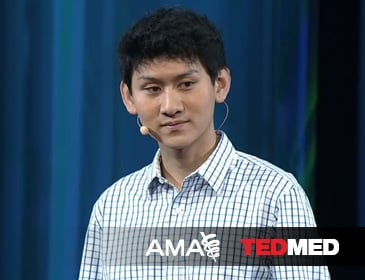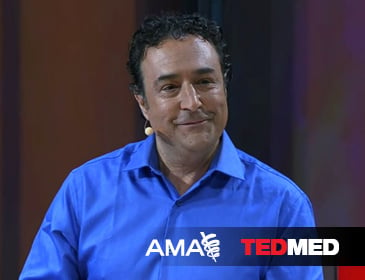If physicians are going to lead health care changes, they’ll need to take unconventional approaches, ask a lot of questions and support innovation, speakers emphasized at TEDMED 2014, which began Wednesday and ran through Friday in San Francisco and Washington, D.C.
And challenging the status quo starts with changes in how the profession trains physicians of tomorrow. Specifically, it’s about injecting curiosity back into the learning process, according to Eric Chen, an 18-year-old “scientific wunderkind” who was recently awarded the grand prize at the Google Science Fair, the Siemens Competition and the Intel Science Talent Search for his work combining computer models and biological assays to speed up discovery of new anti-influenza drugs.
In traditional education systems today, “the focus is on memorizing answers to questions, rather than proposing and asking your own [questions],” said Chen, a freshman at Harvard University. “The way we frame our inquiries shapes the way we make our discoveries.”
Leading innovation might require physicians to learn new things that are not traditional components of the medical school curriculum. John La Puma, MD, the first physician to teach a cooking and nutrition course at a U.S. medical school, said food is the most important health care intervention the country has in its fight against chronic disease.
“Food can save your life, if you know how to use it,” Dr. La Puma said. “Unlike prescription medication, food is sustainable. ... If doctors knew a little bit more about food, and were able to write culinary medicine prescriptions on prescription pads—recipes on prescription pads—they would find their patients totally more engaged about the importance of food in controlling their disease.”
And learning by doing is crucial, said Carla Pugh, MD, PhD, vice chair of education and patient safety at the University of Wisconsin School of Medicine and Public Health and clinical director of the University of Wisconsin Health Clinical Simulation Program.
"Doctors go through years and years of training to become top notch, elite professionals,” Dr. Pugh said. “But we don’t have a test for hands-on skills, and we desperately need one. ... Let’s take medical training, and specifically assessment and testing, to the next level—above and beyond the paper tests."
Watch TEDMED on-demand from your computer or personal device through Tuesday. Visit the TEDMED 2014 website and enter invitation code “TMLicAMA14” to participate. Video of the above speakers now can be found on demand at the TEDMED site.
The AMA is a global institution partner of TEDMED 2014.





